 |
| Bart Simpson appreciating some gay culture |
 |
| Heel, toe, heel, toe… |
 |
| “Fresh!” |
 |
| “Put on this fuschiatard! You are a fairy.” |
 |
| “Sisters doin’ it for themselves!” |
The radical notion that women like good movies
 |
| Bart Simpson appreciating some gay culture |
 |
| Heel, toe, heel, toe… |
 |
| “Fresh!” |
 |
| “Put on this fuschiatard! You are a fairy.” |
 |
| “Sisters doin’ it for themselves!” |
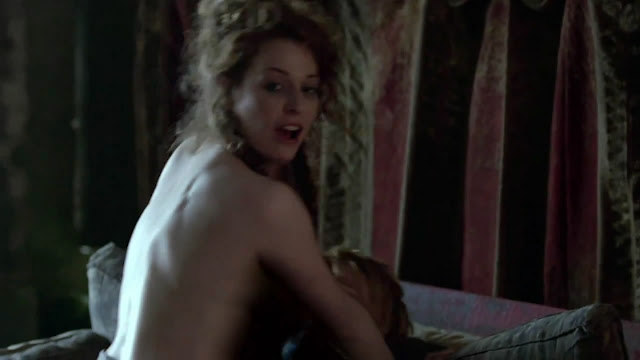 |
| Ros from Game of Thrones. Full frontal nudity in 3… 2… 1… |
 |
| Doreah: not nude in this scene, but give her a minute |
“A frustrated Weiss responded to a question about the amount of sex and nudity on the show, and the commentary about it, by saying, ‘We put in the show what we think belongs in the show. There are going to be people who think there’s too much of something, or not enough. If you create a show with a committee of a million people, you’re not going to make a very good show. We do what’s right to us.'”
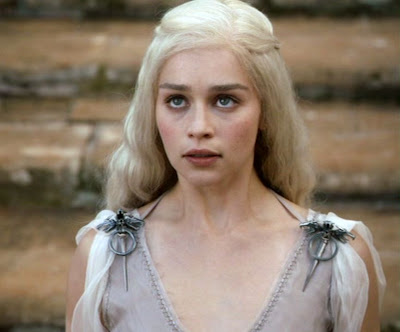 |
| Daenerys Targaryen, between one nude scene and another |
———-
Yes, ‘Game of Thrones’ is a show that loves its nudity. HBO is known for gratuitous displays of naked ladies in many of its show, but ‘Game of Thrones’ might as well exist on a network called HBOOB.
 |
| Ros from Game of Thrones. Full frontal nudity in 3… 2… 1… |
 |
| Doreah: not nude in this scene, but give her a minute |
“A frustrated Weiss responded to a question about the amount of sex and nudity on the show, and the commentary about it, by saying, ‘We put in the show what we think belongs in the show. There are going to be people who think there’s too much of something, or not enough. If you create a show with a committee of a million people, you’re not going to make a very good show. We do what’s right to us.'”
 |
| Daenerys Targaryen, between one nude scene and another |
———-
 |
| Charlotte Lu, Lizzie Bennet, Lydia Bennet, and Jane Bennet |
 |
| “Kitty” Bennet with Lydia and Cousin Mary |
 |
| Fitz William plays along with Lizzie |
 |
||
| William Darcy and Lizzie can’t believe there are only a few episodes left! |
Written by Lady T.
 |
| Yvette Nicole Brown as Shirley Bennett on Community |
Anyone who has absorbed even a little bit of pop culture can see that the “sassy ethnic woman” archetype is ubiquitous in television and film. Women of color – particularly black and Latina women – are often used as sassy, finger-snapping side characters who exist only to provide amusing one-liners in the background of whatever white person drama or comic event happening in the forefront. (On a great scene from Scrubs, Carla and Laverne demonstrate how to act like a “minority sidekick from a bad movie”:)
One refreshing departure from the “sassy ethnic woman” stereotype is Shirley Bennett on Community. Played by Yvette Nicole Brown, Shirley is one of four people of color in the show’s main cast, though the only woman of color. In an interview with The Daily Beast, which included cast members Alison Brie and Gillian Jacobs and writer Megan Ganz, Brown discussed why Shirley is a refreshing character for her to play:
As a black actor, it’s refreshing that I’m not playing the “sassy black woman.” It’s something that Dan Harmon was cognizant of from the beginning. It is something that I’m always cognizant of. Every woman on the planet has sass and smart-ass qualities in them, but it seems sometimes only black women are defined by it. Shirley is a fully formed woman that had a sassy moment. Her natural set point, if anything, is rage. That’s her natural set point, suppressed rage, which comes out as kindness and trying to keep everything tight.
Shirley is, perhaps, the only main character on Community who has her own catchphrase, but the catchphrase – “That’s nice!” – is a far cry from the finger-snapping talking-through-the-nose stereotype demonstrated on the above clip from Scrubs. Shirley is exactly what Brown described: a woman filled with suppressed rage who covers up her anger by trying to be sweet and kind. But rather than being an example of a different kind of negative black stereotype – the Angry Black Person who bursts into a rage for no stated reason – the Community writers and Brown show that Shirley has plenty of reasons to be angry.
Like the other members of the Spanish study group, Shirley comes to Greendale Community College when she needs to start a new chapter in her life after the first chapter ended badly: her husband abandoned her and their two children, and she wants to earn a business degree so she can sell her baked goods. Christian and motherly, Shirley takes on a protective nature to the youngest members of the group (Annie, Troy, and Abed), tries to develop a camaraderie with Britta and act as a cheerleader for her flirty dynamic with Jeff, and does her best to ignore the sexual harassment from Pierce.
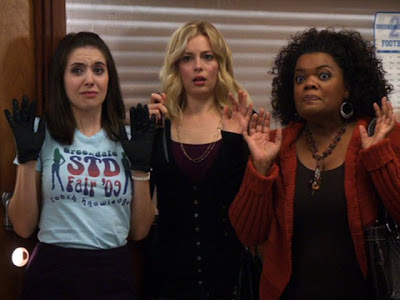 |
| Annie (Alison Brie), Britta (Gillian Jacobs), and Shirley get caught in a “reverse Porky’s” shenanigan |
Soon, Shirley develops close bonds with other members of the study group, trying to keep the group dynamic sweet, light, and happy – but time and time, her repressed anger rises to the surface.
Shirley flies into a rage when Jeff shows interest in a woman other than Britta, acting indignant on Britta’s behalf, but she later admits that she’s still in deep pain over her own divorce: “I was too proud to admit I was hurt, so I had to pretend you were,” she says to her friend.
Shirley is put out and offended when her friends don’t want to attend her Christmas party, taking their reluctance as an insult to her faith, but again, Britta gets to the heart of the matter: Shirley is desperate to recreate a tradition that’s important to her, that’s missing from her life since her painful divorce.
Shirley, when given a chance to act as campus security with Annie for a few days, insists on being the “bad cop” of the duo, a role that Annie also claims. The two characters clash during most of the episode because both are desperate for a change in image. While Annie wants people to stop seeing her as a sweet little girl, Shirley wants people to stop seeing her as a sweet motherly type. (More on that in a minute.)
 |
| Annie and Shirley as campus security officers |
In short: Shirley has a lot of anger. What makes Shirley’s anger so refreshing is that her anger is not portrayed as a sign of her blackness, or her womanhood, but as the sign of a flawed, complex human being with legitimate pain. Sometimes her anger is towards a perceived slight that has nothing to do with her (assuming that her friends judge her for her Christianity when they don’t), and sometimes her anger is completely justified (getting fed up with Pierce’s harassment and racist comments). Sometimes she’s wrong, and sometimes she’s right – just like any other person.
Anger isn’t a character trait limited to Shirley, either. Annie also has repressed rage. The two women have a lot in common, “aww”-ing over cute things and getting upset when they’re not taken seriously. But of all the other characters in Community, Shirley seems to have the closest bond with Jeff. On the surface, they have little in common – he’s a white playboy sarcastic former lawyer, she’s a married black Christian woman with children – but just as Shirley covers her anger with a layer of sweetness, Jeff covers his with layers of blasé indifference. The fact that a young, insecure Shirley turns out to be Jeff’s former bully from when they were children seems perfect for their characters, and their friendship deepens – and some of their anger is assuaged – after they confront this issue.
 |
| Jeff (Joel McHale) and Shirley, BFFs (sort of) |
Sometimes the writers on Community give Shirley short shrift compared to the other characters, as if they’re not sure what to do with a woman who is now re-married and in a happy relationship (their strengths are in writing damaged people, not content people). I’d also like the show to further explore her complicated dynamic with Britta, a woman with whom Shirley craves close friendship, but also finds threatening. Still, I’m grateful that Community allows Shirley to be as flawed, funny, and complicated as everyone else at Greendale Community College. She’s my younger brother’s favorite character, and I think that’s nice.
———-
As a black actor, it’s refreshing that I’m not playing the “sassy black woman.” It’s something that Dan Harmon was cognizant of from the beginning. It is something that I’m always cognizant of. Every woman on the planet has sass and smart-ass qualities in them, but it seems sometimes only black women are defined by it. Shirley is a fully formed woman that had a sassy moment. Her natural set point, if anything, is rage. That’s her natural set point, suppressed rage, which comes out as kindness and trying to keep everything tight. – See more at: http://www.thedailybeast.com/articles/2012/02/28/community-alison-brie-yvette-nicole-brown-gillian-jacobs-megan-ganz-roundtable.html#sthash.cAOgrEkS.dpufAs a black actor, it’s refreshing that I’m not playing the “sassy black woman.” It’s something that Dan Harmon was cognizant of from the beginning. It is something that I’m always cognizant of. Every woman on the planet has sass and smart-ass qualities in them, but it seems sometimes only black women are defined by it. Shirley is a fully formed woman that had a sassy moment. Her natural set point, if anything, is rage. That’s her natural set point, suppressed rage, which comes out as kindness and trying to keep everything tight. – See more at: http://www.thedailybeast.com/articles/2012/02/28/community-alison-brie-yvette-nicole-brown-gillian-jacobs-megan-ganz-roundtable.html#sthash.cAOgrEkS.dpufAs a black actor, it’s refreshing that I’m not playing the “sassy black woman.” It’s something that Dan Harmon was cognizant of from the beginning. It is something that I’m always cognizant of. Every woman on the planet has sass and smart-ass qualities in them, but it seems sometimes only black women are defined by it. Shirley is a fully formed woman that had a sassy moment. Her natural set point, if anything, is rage. That’s her natural set point, suppressed rage, which comes out as kindness and trying to keep everything tight. – See more at: http://www.thedailybeast.com/articles/2012/02/28/community-alison-brie-yvette-nicole-brown-gillian-jacobs-megan-ganz-roundtable.html#sthash.cAOgrEkS.dpuf
Written by Lady T.
 |
| Yvette Nicole Brown as Shirley Bennett on Community |
Anyone who has absorbed even a little bit of pop culture can see that the “sassy ethnic woman” archetype is ubiquitous in television and film. Women of color – particularly black and Latina women – are often used as sassy, finger-snapping side characters who exist only to provide amusing one-liners in the background of whatever white person drama or comic event happening in the forefront. (On a great scene from Scrubs, Carla and Laverne demonstrate how to act like a “minority sidekick from a bad movie”:)
One refreshing departure from the “sassy ethnic woman” stereotype is Shirley Bennett on Community. Played by Yvette Nicole Brown, Shirley is one of four people of color in the show’s main cast, though the only woman of color. In an interview with The Daily Beast, which included cast members Alison Brie and Gillian Jacobs and writer Megan Ganz, Brown discussed why Shirley is a refreshing character for her to play:
As a black actor, it’s refreshing that I’m not playing the “sassy black woman.” It’s something that Dan Harmon was cognizant of from the beginning. It is something that I’m always cognizant of. Every woman on the planet has sass and smart-ass qualities in them, but it seems sometimes only black women are defined by it. Shirley is a fully formed woman that had a sassy moment. Her natural set point, if anything, is rage. That’s her natural set point, suppressed rage, which comes out as kindness and trying to keep everything tight.
Shirley is, perhaps, the only main character on Community who has her own catchphrase, but the catchphrase – “That’s nice!” – is a far cry from the finger-snapping talking-through-the-nose stereotype demonstrated on the above clip from Scrubs. Shirley is exactly what Brown described: a woman filled with suppressed rage who covers up her anger by trying to be sweet and kind. But rather than being an example of a different kind of negative black stereotype – the Angry Black Person who bursts into a rage for no stated reason – the Community writers and Brown show that Shirley has plenty of reasons to be angry.
Like the other members of the Spanish study group, Shirley comes to Greendale Community College when she needs to start a new chapter in her life after the first chapter ended badly: her husband abandoned her and their two children, and she wants to earn a business degree so she can sell her baked goods. Christian and motherly, Shirley takes on a protective nature to the youngest members of the group (Annie, Troy, and Abed), tries to develop a camaraderie with Britta and act as a cheerleader for her flirty dynamic with Jeff, and does her best to ignore the sexual harassment from Pierce.
 |
| Annie (Alison Brie), Britta (Gillian Jacobs), and Shirley get caught in a “reverse Porky’s” shenanigan |
Soon, Shirley develops close bonds with other members of the study group, trying to keep the group dynamic sweet, light, and happy – but time and time, her repressed anger rises to the surface.
Shirley flies into a rage when Jeff shows interest in a woman other than Britta, acting indignant on Britta’s behalf, but she later admits that she’s still in deep pain over her own divorce: “I was too proud to admit I was hurt, so I had to pretend you were,” she says to her friend.
Shirley is put out and offended when her friends don’t want to attend her Christmas party, taking their reluctance as an insult to her faith, but again, Britta gets to the heart of the matter: Shirley is desperate to recreate a tradition that’s important to her, that’s missing from her life since her painful divorce.
Shirley, when given a chance to act as campus security with Annie for a few days, insists on being the “bad cop” of the duo, a role that Annie also claims. The two characters clash during most of the episode because both are desperate for a change in image. While Annie wants people to stop seeing her as a sweet little girl, Shirley wants people to stop seeing her as a sweet motherly type. (More on that in a minute.)
 |
| Annie and Shirley as campus security officers |
In short: Shirley has a lot of anger. What makes Shirley’s anger so refreshing is that her anger is not portrayed as a sign of her blackness, or her womanhood, but as the sign of a flawed, complex human being with legitimate pain. Sometimes her anger is towards a perceived slight that has nothing to do with her (assuming that her friends judge her for her Christianity when they don’t), and sometimes her anger is completely justified (getting fed up with Pierce’s harassment and racist comments). Sometimes she’s wrong, and sometimes she’s right – just like any other person.
Anger isn’t a character trait limited to Shirley, either. Annie also has repressed rage. The two women have a lot in common, “aww”-ing over cute things and getting upset when they’re not taken seriously. But of all the other characters in Community, Shirley seems to have the closest bond with Jeff. On the surface, they have little in common – he’s a white playboy sarcastic former lawyer, she’s a married black Christian woman with children – but just as Shirley covers her anger with a layer of sweetness, Jeff covers his with layers of blasé indifference. The fact that a young, insecure Shirley turns out to be Jeff’s former bully from when they were children seems perfect for their characters, and their friendship deepens – and some of their anger is assuaged – after they confront this issue.
 |
| Jeff (Joel McHale) and Shirley, BFFs (sort of) |
Sometimes the writers on Community give Shirley short shrift compared to the other characters, as if they’re not sure what to do with a woman who is now re-married and in a happy relationship (their strengths are in writing damaged people, not content people). I’d also like the show to further explore her complicated dynamic with Britta, a woman with whom Shirley craves close friendship, but also finds threatening. Still, I’m grateful that Community allows Shirley to be as flawed, funny, and complicated as everyone else at Greendale Community College. She’s my younger brother’s favorite character, and I think that’s nice.
———-
As a black actor, it’s refreshing that I’m not playing the “sassy black woman.” It’s something that Dan Harmon was cognizant of from the beginning. It is something that I’m always cognizant of. Every woman on the planet has sass and smart-ass qualities in them, but it seems sometimes only black women are defined by it. Shirley is a fully formed woman that had a sassy moment. Her natural set point, if anything, is rage. That’s her natural set point, suppressed rage, which comes out as kindness and trying to keep everything tight. – See more at: http://www.thedailybeast.com/articles/2012/02/28/community-alison-brie-yvette-nicole-brown-gillian-jacobs-megan-ganz-roundtable.html#sthash.cAOgrEkS.dpufAs a black actor, it’s refreshing that I’m not playing the “sassy black woman.” It’s something that Dan Harmon was cognizant of from the beginning. It is something that I’m always cognizant of. Every woman on the planet has sass and smart-ass qualities in them, but it seems sometimes only black women are defined by it. Shirley is a fully formed woman that had a sassy moment. Her natural set point, if anything, is rage. That’s her natural set point, suppressed rage, which comes out as kindness and trying to keep everything tight. – See more at: http://www.thedailybeast.com/articles/2012/02/28/community-alison-brie-yvette-nicole-brown-gillian-jacobs-megan-ganz-roundtable.html#sthash.cAOgrEkS.dpufAs a black actor, it’s refreshing that I’m not playing the “sassy black woman.” It’s something that Dan Harmon was cognizant of from the beginning. It is something that I’m always cognizant of. Every woman on the planet has sass and smart-ass qualities in them, but it seems sometimes only black women are defined by it. Shirley is a fully formed woman that had a sassy moment. Her natural set point, if anything, is rage. That’s her natural set point, suppressed rage, which comes out as kindness and trying to keep everything tight. – See more at: http://www.thedailybeast.com/articles/2012/02/28/community-alison-brie-yvette-nicole-brown-gillian-jacobs-megan-ganz-roundtable.html#sthash.cAOgrEkS.dpuf
Written by Lady T.
 |
| Denzel Washington in Flight |
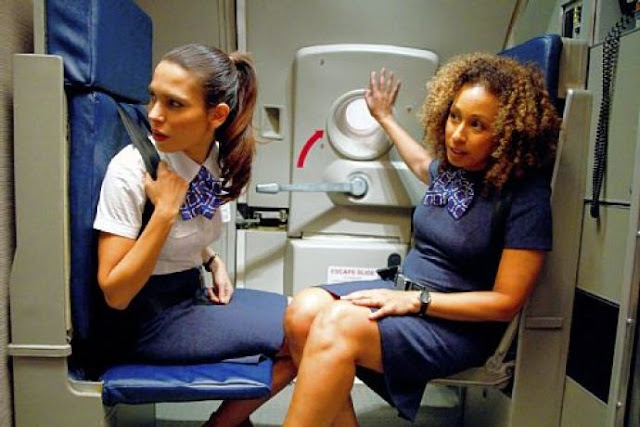 |
| Nadine Velazquez as Katerine Marquez and Tamara Tunie as Margaret Thomason in Flight |
 |
| Whip addressing the press outside his ex-wife’s house |
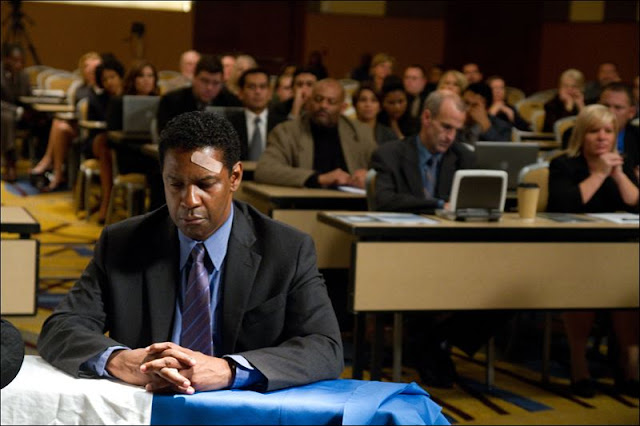 |
| Whip right before (eventually) doing the right thing |
———-
Written by Lady T.
 |
| Denzel Washington in Flight |
 |
| Nadine Velazquez as Katerine Marquez and Tamara Tunie as Margaret Thomason in Flight |
 |
| Whip addressing the press outside his ex-wife’s house |
 |
| Whip right before (eventually) doing the right thing |
———-
Written by Lady T
I want to talk a little about the Oscar nominees this year. (“But, Lady T, you talk too much about the Oscars.” “Oh yeah? Your MOM talks too much about the Oscars!”)
 |
| Seriously, she can’t shut up about him. |
Mostly, I want to talk about the Oscars in terms of diversity. We all know that the Academy Awards are usually all about white dudes recognizing other white dudes (and women, in the acting categories). How did the Academy fare this year in terms of recognizing women in non-acting roles, and people of color in general? Let’s take a look.
Number of Men Nominated for Best Director: 5/5
Commentary: Kathryn Bigelow was infamously snubbed for a directing nomination for her work on Zero Dark Thirty. Was this a deliberate act of sexism on the part of the Academy? I would say yes, except for the fact that Ben Affleck was also overlooked for his work on Argo, and they were both considered frontrunners in this category. (Bigelow won almost all the precursor awards prior to the announcement of the Oscar nominations, and Affleck has won all the precursor awards after the announcement.) I think Bigelow and Affleck were overlooked simply because everyone underestimated the appeal of Amour and Beasts of the Southern Wild, the two little movies that could. The backlash against Bigelow in the press, however, certainly reeks of sexism.
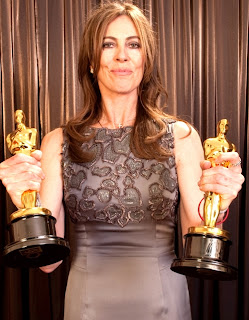 |
| Whatevs, she already has two. |
Number of People of Color Nominated for Best Director: 1/5
Commentary: Ang Lee is nominated for his work on Life of Pi. This is good news, because Ang Lee is an excellent director and deserves every nomination that comes his way.
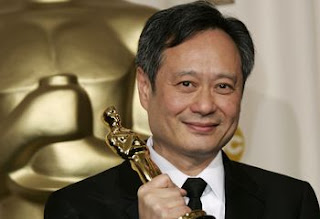 |
| The “A” in “Ang” stands for “Awesome.” |
Number of Best Picture-Nominated Films With a Person of Color as a Protagonist: 4/9
Number of Best Picture-Nominated Films With a Person of Color as a Protagonist, Played by a POC Actor: 3/9
Commentary: Beasts of the Southern Wild, Django Unchained, and Life of Pi have all been nominated for Best Picture, and their films all have POC actors/protagonists (Quvenzhane Wallis, Jamie Foxx, and Suraj Sharma, respectively). Argo technically has a POC protagonist, but the role played by a white actor (Ben Affleck). I don’t know whether Affleck cast himself out of vanity, an understandable desire to perform and direct at the same time, fear that the racist film industry wouldn’t stand behind and promote a film without a famous white actor in the lead role, or all of the above.
 |
| Jamie Foxx as Django in my favorite movie of the year |
Number of Best Picture Winners With a Person of Color as a Protagonist, Played By a POC Actor: 5.5/84
Commentary: In the history of the Academy Awards, 5.5 films with POC as protagonists have won the Best Picture award – In The Heat of the Night, Gandhi, Driving Miss Daisy, The Last Emperor, Slumdog Millionaire, and Crash. (I said 5.5 because Crash is an ensemble film without a clear protagonist, and also because it’s not well-written and barely counts a movie.) It’s also worth noting that two of those films – In the Heat of the Night and Driving Miss Daisy – have white co-protagonists who share an equal load with their POC co-leads.
So, this year’s crop of Best Picture nominees have almost as many POC leads as all Best Picture WINNERS in history. Does that make this year awesome or previous years really, really white? Make of that what you will.
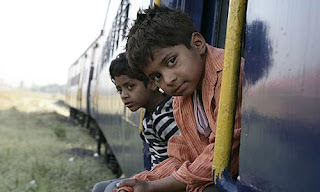 |
| The unbelievably cute kids in Slumdog Millionaire |
Number of Best Actor Nominees From Best Picture Nominees: 3/5
Number of Best Actress Nominees From Best Picture Nominees: 4/5
Commentary: Last year, exactly one Best Picture nominee out of nine (The Help) had a female protagonist, and only one Best Actress nominee was from a Best Picture nominee. (Three of the Best Actor nominees were from Best Picture nominees.) This year, the number of Best Actress nominees from Best Picture nominees actually outnumber the number of Best Actor nominees from Best Picture nominees.
Now, it’s worth mentioning that two of these Best Actress nominees – Jennifer Lawrence in Silver Linings Playbook and Emmanuelle Riva in Amour – are co-protagonists to their male leads, played by Bradley Cooper and Jean-Louis Trintignant. But Quvenzhane Wallis in Beasts of the Southern Wild and Jessica Chastain in Zero Dark Thirty are unquestionably the leads in their films.
 |
| Quvenzhane Wallis in my other favorite movie of the year |
Is the Academy finally starting to recognize that movies starring women, about women, are worthwhile films, films that tell universal stories about the human condition, films that are not just “women’s films?” Let’s hope so.
Did you notice anything about the diversity, and lack thereof, in the Academy Award nominations? Have at it at the comments!
Lady T is an aspiring writer and comedian with two novels, a play, and a collection of comedy sketches in progress. She hopes to one day be published and finish one of her projects (not in that order). You can find more of her writing at The Funny Feminist, where she picks apart entertainment and reviews movies she hasn’t seen.
Written by Lady T
I want to talk a little about the Oscar nominees this year. (“But, Lady T, you talk too much about the Oscars.” “Oh yeah? Your MOM talks too much about the Oscars!”)
 |
| Seriously, she can’t shut up about him. |
Mostly, I want to talk about the Oscars in terms of diversity. We all know that the Academy Awards are usually all about white dudes recognizing other white dudes (and women, in the acting categories). How did the Academy fare this year in terms of recognizing women in non-acting roles, and people of color in general? Let’s take a look.
Number of Men Nominated for Best Director: 5/5
Commentary: Kathryn Bigelow was infamously snubbed for a directing nomination for her work on Zero Dark Thirty. Was this a deliberate act of sexism on the part of the Academy? I would say yes, except for the fact that Ben Affleck was also overlooked for his work on Argo, and they were both considered frontrunners in this category. (Bigelow won almost all the precursor awards prior to the announcement of the Oscar nominations, and Affleck has won all the precursor awards after the announcement.) I think Bigelow and Affleck were overlooked simply because everyone underestimated the appeal of Amour and Beasts of the Southern Wild, the two little movies that could. The backlash against Bigelow in the press, however, certainly reeks of sexism.
 |
| Whatevs, she already has two. |
Number of People of Color Nominated for Best Director: 1/5
Commentary: Ang Lee is nominated for his work on Life of Pi. This is good news, because Ang Lee is an excellent director and deserves every nomination that comes his way.
 |
| The “A” in “Ang” stands for “Awesome.” |
Number of Best Picture-Nominated Films With a Person of Color as a Protagonist: 4/9
Number of Best Picture-Nominated Films With a Person of Color as a Protagonist, Played by a POC Actor: 3/9
Commentary: Beasts of the Southern Wild, Django Unchained, and Life of Pi have all been nominated for Best Picture, and their films all have POC actors/protagonists (Quvenzhane Wallis, Jamie Foxx, and Suraj Sharma, respectively). Argo technically has a POC protagonist, but the role played by a white actor (Ben Affleck). I don’t know whether Affleck cast himself out of vanity, an understandable desire to perform and direct at the same time, fear that the racist film industry wouldn’t stand behind and promote a film without a famous white actor in the lead role, or all of the above.
 |
| Jamie Foxx as Django in my favorite movie of the year |
Number of Best Picture Winners With a Person of Color as a Protagonist, Played By a POC Actor: 5.5/84
Commentary: In the history of the Academy Awards, 5.5 films with POC as protagonists have won the Best Picture award – In The Heat of the Night, Gandhi, Driving Miss Daisy, The Last Emperor, Slumdog Millionaire, and Crash. (I said 5.5 because Crash is an ensemble film without a clear protagonist, and also because it’s not well-written and barely counts a movie.) It’s also worth noting that two of those films – In the Heat of the Night and Driving Miss Daisy – have white co-protagonists who share an equal load with their POC co-leads.
So, this year’s crop of Best Picture nominees have almost as many POC leads as all Best Picture WINNERS in history. Does that make this year awesome or previous years really, really white? Make of that what you will.
 |
| The unbelievably cute kids in Slumdog Millionaire |
Number of Best Actor Nominees From Best Picture Nominees: 3/5
Number of Best Actress Nominees From Best Picture Nominees: 4/5
Commentary: Last year, exactly one Best Picture nominee out of nine (The Help) had a female protagonist, and only one Best Actress nominee was from a Best Picture nominee. (Three of the Best Actor nominees were from Best Picture nominees.) This year, the number of Best Actress nominees from Best Picture nominees actually outnumber the number of Best Actor nominees from Best Picture nominees.
Now, it’s worth mentioning that two of these Best Actress nominees – Jennifer Lawrence in Silver Linings Playbook and Emmanuelle Riva in Amour – are co-protagonists to their male leads, played by Bradley Cooper and Jean-Louis Trintignant. But Quvenzhane Wallis in Beasts of the Southern Wild and Jessica Chastain in Zero Dark Thirty are unquestionably the leads in their films.
 |
| Quvenzhane Wallis in my other favorite movie of the year |
Is the Academy finally starting to recognize that movies starring women, about women, are worthwhile films, films that tell universal stories about the human condition, films that are not just “women’s films?” Let’s hope so.
Did you notice anything about the diversity, and lack thereof, in the Academy Award nominations? Have at it at the comments!
Lady T is a writer with two novels, a play, and a collection of comedy sketches in progress. She hopes to one day be published and finish one of her projects (not in that order). You can find more of her writing at www.theresabasile.com.
When Seth MacFarlane was picked to host the 2013 Academy Awards, my esteemed colleague Robin Hitchcock wrote a list of preferable hosts, including the Oogieloves, the Romney sons, and Jennifer Aniston handcuffed to Angelina Jolie. I share many of Robin’s criticisms of him and his mean style of comedy that continually marginalizes already-marginalized people. Occasionally, his jokes can make me laugh very hard (such as the “Fuck You, Thunder!” song from Ted), but those occasions are increasingly rare. I also can’t understand the logic behind picking MacFarlane even from a ratings standpoint; are fans of Seth MacFarlane’s comedy really going to tune into the Academy Awards instead of Seth MacFarlane’s animated shows that air at the same time? Even if the episodes are reruns that night?
 |
| A rare inspired bit of MacFarlane comedy |
Anyway, MacFarlane’s hosting is a done deal, and I’m going to watch the ceremony no matter who’s hosting. Who knows? Maybe he’ll be a pleasant surprise. For future ceremonies, though, I’d like to see the Academy stop trying to appeal to a younger demographic (remember that disaster with James Franco and Anne Hathaway?) and stick to picking people who will just do a good job. Here are my suggestions for future Oscar hosts, presented in no particular order.
1. Tom Hanks
I would love for the Academy to break its pattern of picking straight white guys, believe me, but I’ll make an exception for Tom Hanks, because Tom Hanks needs to host the Oscars.Tom Hanks is a national treasure. He’s a very good actor, personable, hilarious, and willing to take the piss out of everyone and everything, especially himself. I still remember Steve Martin’s joke from his first hosting gig: “There’s been an update in the plot to kidnap Russell Crowe, and all I have to say is – Tom Hanks, I’m very ashamed of you.” Martin’s joke was funny enough on its own, but then the camera cut to Hanks in the audience looking shame-faced and mouthing, “I’m sorry,” which made it hilarious and memorable.
Also, he did slam poetry about Full House on Jimmy Fallon’s show.
Tom Hanks is a likable guy, and his humor is very surprising and unpredictable without being obnoxiously “edgy” in a “look at me, I’m so edgy because I’m un-PC!” way. Make it happen, Academy.
2. Emma Thompson
Homer Simpson once said about Daniel Craig, “Is America ready for a British James Bond?” (Oh, Homer. Never change.) Others may have a similar question about Emma Thompson: “Is America ready for a British Oscar host?” Well, this American is. Emma Thompson is a multi-talented, classy lady, a renowned actress (and my personal favorite). Sometimes people forget how funny she can be. If you need a reminder, check out her Golden Globes acceptance speech for Sense and Sensibility, where her speech was written in the style of Jane Austen.
Sure, Jane Austen-related humor isn’t going to appeal to every Oscar viewer, but Thompson is versatile in the type of comedy she can do (and has done). She’s charming and witty, and she’d probably completely outclass the joint, which is why the Academy would never pick her, but they should.
3. Neil Patrick Harris and Jane Lynch
Two obvious choices, as they’ve both hosted award shows in recent history, but why not have them host together in an awesomely funny LGBTQ duo? They both know how to sing and dance, they had comic chemistry in the one episode of Glee they did together, and their stars are both on the rise without any sign of stopping.
I want to see this pair in action. Harris is halfway to a hosting EGOT already (if there were such a thing), and I still laugh when I remember this joke from Lynch at the Emmys: “People have often asked me why I’m a lesbian. Ladies and gentlemen, the cast of Entourage!”
4. Samuel L. Jackson
Everyone likes Samuel L. Jackson. If I meet a person who dislikes Samuel L. Jackson, I automatically find that person untrustworthy. I haven’t seen him in any kind of hosting capacity, but he’s got a great sense of humor and natural charm, and he’s one of the few potential Oscar hosts that could appeal to the stuffy Academy snobs and the populist youth demographic the Academy desperately courts every year.
Also, consider this: if Samuel L. Jackson hosts the Oscars, we can have a montage of Samuel L. Jackson movies at some point, because why not? (Side note: he totally should’ve been nominated for Django Unchained, by the way.)
5. The Muppets
You think I am kidding. I am not. I don’t care if the pupeteering logistics would make this difficult. Kermit would be the best host ever, Miss Piggy could try to steal attention from the other actresses, Fozzie could write all of the awards patter, and Gonzo can choreograph stunts and chicken dance numbers set to the Best Original Score nominees while Statler & Waldorf heckle them. We can even have the Sesame Street Muppets make an appearance so there can be an actual Oscar at the Oscars.
This needs to happen.
When Seth MacFarlane was picked to host the 2013 Academy Awards, my esteemed colleague Robin Hitchcock wrote a list of preferable hosts, including the Oogieloves, the Romney sons, and Jennifer Aniston handcuffed to Angelina Jolie. I share many of Robin’s criticisms of him and his mean style of comedy that continually marginalizes already-marginalized people. Occasionally, his jokes can make me laugh very hard (such as the “Fuck You, Thunder!” song from Ted), but those occasions are increasingly rare. I also can’t understand the logic behind picking MacFarlane even from a ratings standpoint; are fans of Seth MacFarlane’s comedy really going to tune into the Academy Awards instead of Seth MacFarlane’s animated shows that air at the same time? Even if the episodes are reruns that night?
 |
| A rare inspired bit of MacFarlane comedy |
Anyway, MacFarlane’s hosting is a done deal, and I’m going to watch the ceremony no matter who’s hosting. Who knows? Maybe he’ll be a pleasant surprise. For future ceremonies, though, I’d like to see the Academy stop trying to appeal to a younger demographic (remember that disaster with James Franco and Anne Hathaway?) and stick to picking people who will just do a good job. Here are my suggestions for future Oscar hosts, presented in no particular order.
1. Tom HanksI would love for the Academy to break its pattern of picking straight white guys, believe me, but I’ll make an exception for Tom Hanks, because Tom Hanks needs to host the Oscars.Tom Hanks is a national treasure. He’s a very good actor, personable, hilarious, and willing to take the piss out of everyone and everything, especially himself. I still remember Steve Martin’s joke from his first hosting gig: “There’s been an update in the plot to kidnap Russell Crowe, and all I have to say is – Tom Hanks, I’m very ashamed of you.” Martin’s joke was funny enough on its own, but then the camera cut to Hanks in the audience looking shame-faced and mouthing, “I’m sorry,” which made it hilarious and memorable.
Also, he did slam poetry about Full House on Jimmy Fallon’s show.
Tom Hanks is a likable guy, and his humor is very surprising and unpredictable without being obnoxiously “edgy” in a “look at me, I’m so edgy because I’m un-PC!” way. Make it happen, Academy.
2. Emma Thompson
Homer Simpson once said about Daniel Craig, “Is America ready for a British James Bond?” (Oh, Homer. Never change.) Others may have a similar question about Emma Thompson: “Is America ready for a British Oscar host?” Well, this American is. Emma Thompson is a multi-talented, classy lady, a renowned actress (and my personal favorite). Sometimes people forget how funny she can be. If you need a reminder, check out her Golden Globes acceptance speech for Sense and Sensibility, where her speech was written in the style of Jane Austen.
Sure, Jane Austen-related humor isn’t going to appeal to every Oscar viewer, but Thompson is versatile in the type of comedy she can do (and has done). She’s charming and witty, and she’d probably completely outclass the joint, which is why the Academy would never pick her, but they should.
3. Neil Patrick Harris and Jane Lynch
Two obvious choices, as they’ve both hosted award shows in recent history, but why not have them host together in an awesomely funny LGBTQ duo? They both know how to sing and dance, they had comic chemistry in the one episode of Glee they did together, and their stars are both on the rise without any sign of stopping.
I want to see this pair in action. Harris is halfway to a hosting EGOT already (if there were such a thing), and I still laugh when I remember this joke from Lynch at the Emmys: “People have often asked me why I’m a lesbian. Ladies and gentlemen, the cast of Entourage!”
4. Samuel L. Jackson
Everyone likes Samuel L. Jackson. If I meet a person who dislikes Samuel L. Jackson, I automatically find that person untrustworthy. I haven’t seen him in any kind of hosting capacity, but he’s got a great sense of humor and natural charm, and he’s one of the few potential Oscar hosts that could appeal to the stuffy Academy snobs and the populist youth demographic the Academy desperately courts every year.
Also, consider this: if Samuel L. Jackson hosts the Oscars, we can have a montage of Samuel L. Jackson movies at some point, because why not? (Side note: he totally should’ve been nominated for Django Unchained, by the way.)
5. The Muppets
You think I am kidding. I am not. I don’t care if the pupeteering logistics would make this difficult. Kermit would be the best host ever, Miss Piggy could try to steal attention from the other actresses, Fozzie could write all of the awards patter, and Gonzo can choreograph stunts and chicken dance numbers set to the Best Original Score nominees while Statler & Waldorf heckle them. We can even have the Sesame Street Muppets make an appearance so there can be an actual Oscar at the Oscars.
This needs to happen.